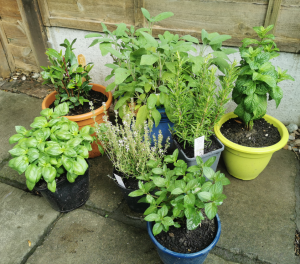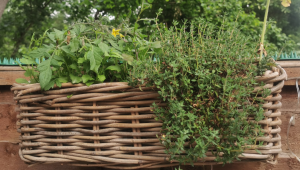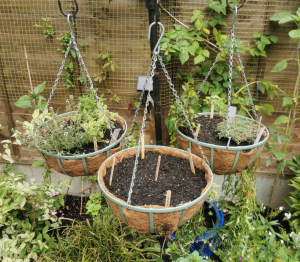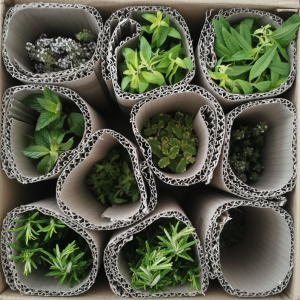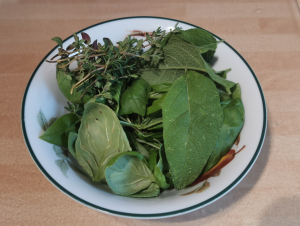
These articles were written pre-lockdown, but you can still buy fresh herb plants in the shops or online.
What Are Herbs?
Herbs are plants that secrete smells which are actually there to deter predators, but we grow them for these smells, and the oils that they produce which flavours food. You can use fresh herbs chopped up, or whole, in meal preparation, or also for a refreshing drink.
Which Ones to Grow?
Grow what you are likely to use! Basil is great with tomato dishes, fennel with fish, rosemary with lamb, thyme with chicken. I looked at the back of a jar of dried mixed herbs to see what is in it, then decided to grow those herbs myself. Mint (most types), lemon balm, and lemon verbena make good herby tea, and rosemary can be used to make a hair rinse.
How Many to Grow?
I am a big believer that more is more. I currently have 8 thyme, 3 sage, 2 rosemary, 3 basil, and 4 types of mint in about 10 different pots or clumps. I love fresh herbs in cooking, and I also like to smell them when I am out in the garden. You may have restricted space (e.g. a windowsill) so choose what you like the best to grow in the space you have available. I also have bay, oregano, and chives – we use fresh bay leaves in curry, and chives are great chopped up into salad.
Where to Grow Herbs
Some herbs can be grown indoors as they do not need to flower or need pollinating. This includes mint, rosemary, thyme, oregano, marjoram, basil, parsley, coriander, lemon balm, sage, and chives.
Some herbs will flower but you can snip these off. If you want to attract lots of insects to your garden, herbs are a great way to get them in! Leave herbs to flower – you can still use them. Chive flowers are edible and make a great salad topper.
You can grow herbs in pots, old fruit punnets, hanging baskets, trough planters hanging over a fence panel, in raised beds, in grow bags, or directly in the ground. Some are shade tolerant, some need a lot of room, some need good drainage – see the list below.
- Fennel – gets super tall! Sometimes 8ft (2.4m).
- Lemon balm, mint – can spread 2ft x 2ft (60cm x 60cm)
- Thyme – some are creeping, so they spread out wide but stay low to the floor
- Sage – gets big and bushy if you let it
- Rosemary – likes well drained sandy soil. Can get big and bushy.
- Lemon verbena is best grown inside as it is not frost tolerant so will die over winter unless it is protected
- Basil tends to last for one year only (or I’m just not very good at keeping it alive!).
- Parsley and coriander can both grow huge, both tall and wide, and they will bolt (go to flower) very easily. These are best grown in small pots indoors where you can keep them in check
- Chives can be grown indoors or out, the flowers and stems can be used.
^^^ thyme in an over-fence hanging trough and herby hanging baskets ^^^
Growing Herbs
I am growing herbs on my allotment directly in the ground, in my garden in raised beds, hanging baskets, pots, and fence planters, and also in the house on the kitchen windowsill. If you are growing things indoors make sure you stand the pot in a tray or bowl to catch the water.
You can cheat and buy herbs from the veg section of most supermarkets, and then pot them up into bigger pots when you get home – this is what I do with basil, mint, parsley and coriander. You can also mail-order fresh herb plants online; try and select a local shop which uses peat free compost and doesn’t use pesticide to ensure you get good quality healthy plants.
You can also start herb at home from seed – this takes longer but would be good family project for children. Basil, sage, parsley, coriander, fennel, and chives all grow well from seed. Mint and rosemary can be propagated from plant cuttings.
Plant Spacing
From the list above you can see that some plants need a lot of room. I have 3 plants in the top of a 30cm hanging basket and 4 around the side.
Crop Rotation
These plants do not need to be rotated like other vegetable crops.
Companion Planting
Herbs make great companion plants! I have a pot of basil next to each of my tomatoes. Some herbs can protect other plants, e.g., planting chives near carrots can protect against carrot fly.
Quantities
This depends on how much you use, and how often. Herbs are great to grow as they are low maintenance, and you only need to cut a few leaves or a twig off to use them in a meal.
Harvesting
Simply cut off what you want with a clean pair of scissors, rinse in a sieve/colander under running tap water (to wash off the bugs), and then use in your meals! The herbs will regrow what you have cut off.
Hints and Tips
If you have any questions, Laura is happy to answer them via email, Facebook or Twitter
- Email: Laura.Hamilton@TCV.org.uk
- Facebook: Health For Life in the Community
- Twitter: TCV_Birmingham
Remember to share your pictures with us on Facebook and Twitter too!
